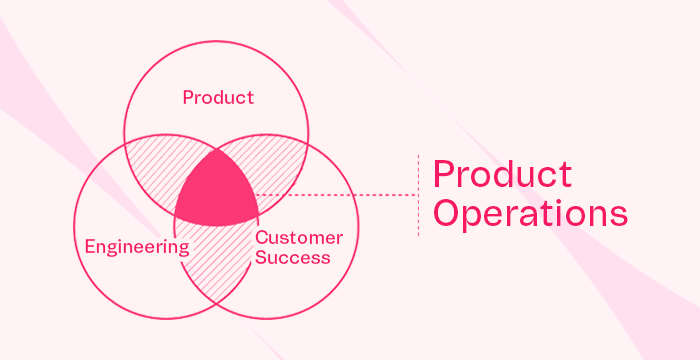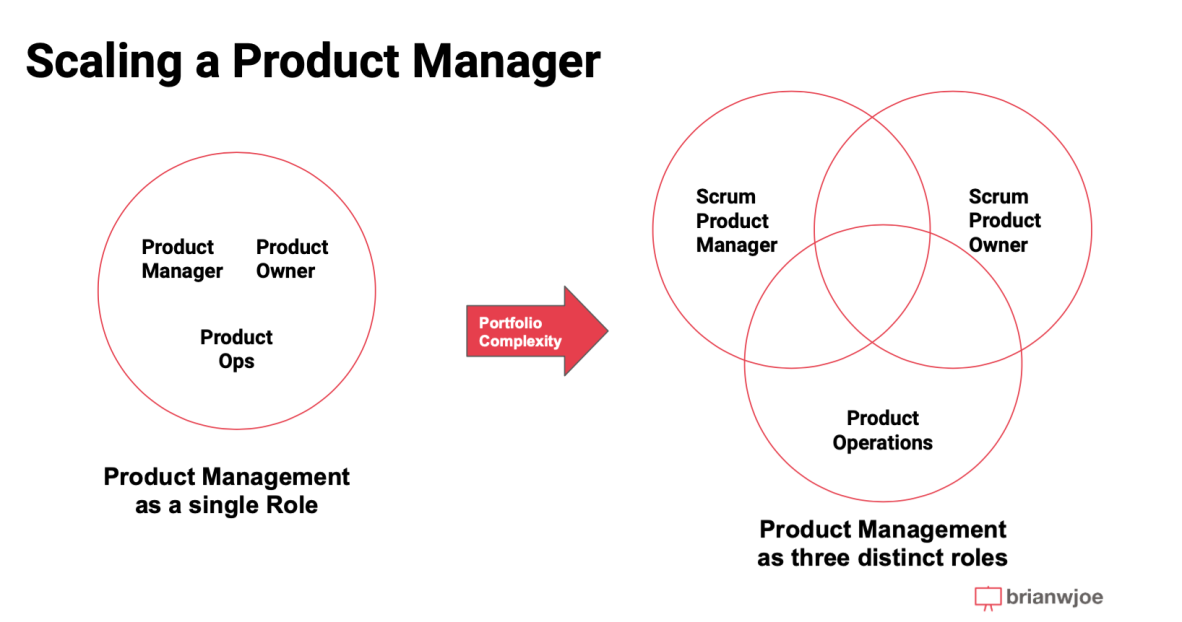
What is Product Ops And Why Is It Important For Your Company
Product Ops facilitates communication across multiple teams and plays a key role in connecting resources and data. The work of product ops makes the product development process easier for the product team and helps to build user-friendly products.
In this post, you can find out the functions of product ops, how it facilitates the internal and external processes to create useful products, what the duties of a product ops manager are, and whether you should hire one or not.
Get The Insights!
The fastest way to learn about Product Growth, Management & Trends.
What Is Product Ops?
Source: careers.vtex.com
Product Ops, which is short for Product Operations, is a function or a role that connects the trio of product developers, engineers, and users.
ProduxLab CEO Melissa Perri says, “Product operations is the secret sauce to really making a product company run at scale.”
When it comes to cross-functional teams, product ops make smooth functioning a lot easier.
But there is no one-size-fits-all definition of product ops. Product ops functions can differ based on the size of the company, the industry the company operates in, or even the type of the product itself.
The overall goal of product ops is to support the product team and increase its efficiency. Organizations need to identify the needs of the product team to define the product ops role they need.
Is Product Management Same As Product Operations?
Source: brianwjoe.com
In a word, no. Product ops exist to facilitate the work of product management. Product Ops sits between the Product Manager’s and Product Owner’s role. While product management is responsible for defining product strategies and taking decisions to shape the product, product ops assist this decision-making process with relevant data.
The need for product ops function rises from the fast-paced market that requires organizations to consistently strive to adapt to the changing landscape.
The role of a Product Manager requires a strategic and customer-centric approach. This calls for making more efficient decisions and streamlining the existing processes. If a product manager needs data to make informed decisions, the product ops or data ops manager collects and analyzes the data.
Product ops track the implementation and outcomes when the product team is experimenting with new ideas and approaches.
The Product Manager defines product goals and makes sure that it is aligned with the company vision. The Product Ops Manager facilitates the communication of these goals and keeps everyone informed.
Product Managers play their most crucial roles before and during product development. But Product Ops Managers have their most important duties after the launch. This is when they identify what is working for users and what is not and gather information on optimizing product performance, which ensures that the product caters to the right needs of the users.
Why Is Product Ops Important For Your Product Team?
The need for product ops functions can vary for organizations. But product ops offer a number of benefits to larger product teams, which helps make the product development process seamless.
Generating Insights From Data
Product teams now have access to more data than ever before. But the large volume of data makes it quite difficult to find what’s relevant and what’s not.
Even though the process of cleaning and managing large volumes of data is arduous, the insights generated are too valuable to ignore. This is where product ops prove to be crucial.
The product ops manager collects, organizes, and analyzes the data available to them and generates insights that the product team can use to build or improve products. This allows product managers to focus on the product development itself rather than spending half of their time trying to make sense of user data.
Some organizations may choose to create a separate Product Ops Analyst role for the analytical tasks. Product Operations Analysts use data to identify and communicate improvements to the product development process. They also coordinate user research and experimentation to help build useful products.
Getting The Right Tools
Product teams have a range of tools to choose from. With the upside of having a tool for every need, the number of options can make it quite overwhelming. This is where product ops come in. Product ops can identify the needs of the product team and find the tools that cater to those needs. They can build a stack of perfectly adequate tools for the team so that the number of tools itself doesn’t become a hassle. This ensures the smooth operating of the product team, which can breathe a sigh of relief for not having to spend most of their time shuffling with the tools.
Establishing Best Practices
Product teams need to be flexible enough to adapt to the changing trends in the industry as well as to best practices that help them maximize productivity. Product ops stay on top of these best practices and look for the tools and methods that boost the efficiency of the product team. Product ops identify the needs of the team and find areas of improvement, creating standard practices. This helps the product team attain optimum results out of their efforts.
Facilitating Onboarding
At times, there may be a need to expand the product team or hire an entirely new team altogether. The new members of the team need to adapt to the organizational practices and keep up with the rest of the team. The process of onboarding can be made easier by product ops, who can outline an onboarding process that helps a new member integrate quickly and smoothly with the team.
Streamlining Routine Tasks
During the product development process, the product team may come across repetitive tasks that they need to attend. These tasks can be time-consuming and slow down the progress of the product team. Product ops can manage these repetitive tasks and find ways to make the process of completing these tasks more efficient. Streamlining routine tasks helps the product team to achieve better results with less effort.
Making Resources Accessible
It can be tough to manage the number of resources that the product team needs to utilize during the product development process. They also need to have access to the right resource at the right stage to be efficient. These include templates, guides, frameworks that are used repeatedly by the product team.
Product ops need to identify and organize the proper resources for each task. They need to make sure these resources can be accessed by the product team whenever they need them.
How Product Ops Helps To Build User-Friendly Products
Managing Feedback
Feedback is a great way of identifying the areas of a product that needs improvement. Product ops can help the product team focus on the improvements by taking care of the feedback management. They can do so by collecting feedback across multiple channels that have good user engagement. These can then be sorted and organized for the product team to figure out the improvements that need to be done. Thus, the work of product ops makes the process of translating feedback to product improvement, resulting in a more satisfied customer base.
Evaluating user feedback is easier than ever! Analyze qualitative user feedback and discover potential areas for revenue expansion with Userpilot. And product teams can customize and launch in-app surveys of different types to gain insights into the mobile app experience.
Resolving Technical Issues
After the product has launched, users might raise various technical issues that they face while using the product. Addressing these issues is crucial to ensure a positive user experience. But it can be tough for the product team to sort through the issues and find the ones that need urgent attention. Product ops can facilitate the support team to prioritize the issues so that they are resolved quickly. This helps the team stop scrambling over every issue they get their hands on and allows them to focus on the improvements that accelerate product growth.
Driving Product Adoption
The main goal of the product team is not just to create products but to create products that people can use. The process of product adoption turns “people” into “users.”
Product ops can work closely with other departments involved to drive product adoptions to make sure that everything is streamlined. They can create a bridge between the users and the marketing team to ensure that the right message reaches the users.
What Are The Duties Of A Product Ops Manager?
Product Ops managers may not always enjoy the spotlight. But there should be no argument that their work to carry on the nitty-gritty part of building products is crucial.
The duties of a product ops manager can be listed as follows:
- Managing product data: Product ops managers facilitate data collection and then generate insights by managing and analyzing them. This is crucial for helping the product team make informed decisions based on concrete data.
- Using Proper Tools: The product ops manager is responsible for managing the product tech stack. They identify the right tools and facilitate the use of these tools for members of the product team.
- Communicating The Strategy: While product ops managers are not responsible for crafting product strategies, they nonetheless play an important role in this aspect. Product ops managers ensure that the product manager’s strategy and vision are relayed to the team so that everyone is on the same page.
- Facilitate Experimentation: Product ops managers play an important role in experimenting with new ideas and approaches by tracking the implementation and outcomes.
- Following Up After Launch: The work of a product ops manager picks up pace after the product is launched. This is when they connect with users to identify the improvements that need to be made and communicate that with the product team, helping to build user-friendly products.
Does Your Company Need Product Ops?
Source: Userpilot.com – talk to our product specialist to discover the best product adoption tool for your business.
Before asking whether you need product ops or not, take a step back and try to understand where the role of product ops fits in your organization.
Are you expanding your team or organization?
According to the Chief Product Officer of Under10 Consulting Steve Johnson, “When you’ve got a large number of product managers and multiple business units, the idea of Product Ops starts becoming really attractive.”
Product ops generally take a load of operational tasks off product managers’ shoulders to help them focus on creating useful products. So, try to understand if your product managers are overwhelmed by their increased responsibilities or having a hard time keeping track of processes.
Is your product team staining to meet deadlines?
At times, repetitive tasks can be time-consuming. These are daily tasks that are essential to complete but can slow down the progress of your product teams. Introducing product ops in such cases will help boost the efficiency and productivity of your product teams.
Product ops not only help to make internal activities more efficient but also create a bridge between the users and the organization. They assist the product team to keep the product in line with user needs through insights generated from user data.
When to hire a Product Ops Manager?
Consider this – if you need a pivotal role in your organization that can facilitate communication and accessibility of resources among multiple teams and keeps everyone aligned to common goals, you need to hire a product ops manager.









